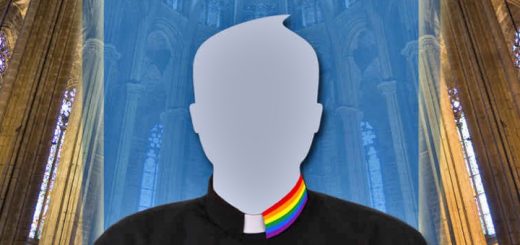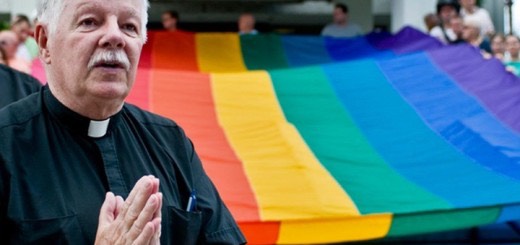An obstacle course. The religious vocation and transgender people in the Catholic church
Article by Ariell Watson Simon* published on the website of the Catholic LGBT association New Ways Ministry (United States) on 6 November 2024, freely translated by Giacomo Tessaro
“I am a transgender man” (I am a transgender man) Maxwell Kuzma said to Pope Francis when they shook hands in St. Peter's Square during a general audience in late October (2024). Maxwell is one of four transgender men who briefly met with the Pope that day.
“It was a privilege and a grace to be able to meet the Pope as I am, without masks and without pretending” wrote on [website] National Catholic Reporter: “I am proud of myself for telling him I am transgender in his language, and I am also proud that the Catholic Church has a Pontiff who looks warmly and pastorally at the transgender members of his flock.”.
The meeting was organized by the Italian Don Andrea Conocchia, no stranger to bringing groups of trans people to the Vatican. This time, in addition to speaking briefly with the Pontiff, the group of trans men gave him the book as a gift “Trans Life and the Catholic Church Today” (Trans life and the Catholic Church today), volume edited by the theologians Nicolete Burbach and Lisa Sowle Cahill, and some personal letters. Francis shook their hands, thanking them and blessing them.
Two of them, George White and Brother Christian Matson, are consecrated. The site National Catholic Reporter recently published an article about them, highlighting the barriers that Catholic trans people face if they want to live the religious life.
George White, a thirty-year-old British man, joined the Catholic Church at the age of sixteen thanks to the support of his Catholic high school. His vocation to the priesthood took place under the Salesian aegis: “The reaction of the order [salesian] was positive, but it nevertheless reflected the Church's current position on transgender issues, and White had to reconcile his vocation with the reality of that position." writes the website. Despite the barriers to religious life and the priesthood, Maxwell now lives his vocation by teaching religion at St. Paul's Catholic School in Leicester, United Kingdom.
Brother Christian Matson is a diocesan hermit from Lexington, Kentucky, received as such by Bishop John Stowe OFM Conv. in 2021; in 2023 he renewed his vows for a period of three years. He is probably the first openly transgender diocesan hermit in the history of the Catholic Church. Before embarking on this path, Brother Matson had tried to enter the Jesuit order. Between 2011 and 2018 he underwent a period of discernment and had many vocational interviews; he was judged a candidate "excellent", but was ultimately rejected due to his transgender status.
National Catholic Reporter also tells the story of James Pawlowicz, another trans man eager to join the Jesuit order. When he came out to the vocations director “the reaction was a mixture of personal support and institutional rejection”; the manager told him “You must be born a man and remain a man to undertake any religious life”.
Canon lawyer Daniel Quinan explains that each order has its own constitutions, but in general they use the traditional definition of biological sex, and not that of gender identity. Cases of transgender people seeking to enter religious life are still rare, but growing.
A year ago, an informal mutual support network was born for [transgender] men who want to do vocational discernment. They meet monthly on Zoom and also in person. Brother Christian has become a point of reference for the group, each of whom has done or is doing a period of discernment, and many of them have been mistreated.
Brother Christian underlines the genuine love for the Church that animates them: “Instead of assuming that we intend to undermine the Church […] one should try to understand that we are here for the Eucharist […] We are here for Christ. This is why we are in the Church, and our life doesn't revolve entirely around being trans: it's centered in Christ.".
Despite rejection, many of these men find ways to live their calling. Brother Christian has “found comfort in the idea that his identity as a friar is intrinsic to his being, and is a vocation difficult to ignore”.
Daniel Quinan is convinced that the principles of canon law can provide for the inclusion of transgender people in religious orders, if the universal vocation to holiness is insisted on. If it is valid for all Catholics “the right and duty to discern a life dedicated to the evangelical counsels of poverty, chastity and obedience”, then transgender people also possess this vocation: “I think that admitting transgender people to the priesthood and religious orders is possible, but then we would have to deal with the concrete reality of each specific case, and this would not always be easy”.
The lives of transgender people who live and minister in the Catholic Church today are full of barriers, but even in the midst of these difficulties, Maxwell Kuzma speaks of the freedom he experienced when he affirmed his identity in front of Pope Francis: “I felt the Holy Spirit moving in Rome, not only in Francis' handshake, but also in the pilgrims filling the square and in the hopeful smiles of my transgender travel companions”.
*Ariell Watson Simon (she) is a hospital chaplain and lives in central Missouri. She joined the Catholic Church in 2011, while studying at Loyola University of Maryland, and earned a degree in theology from Boston College School of Theology and Ministry. She has worked as a chaplain in hospitals and nursing homes in three states; today he works as an assistant in religious studies. He loves doing spiritual direction, writing, and theologically imagining an inclusive Church.
Original text: Pope Francis Greets Transgender Men, Including Some Called to Religious Life





